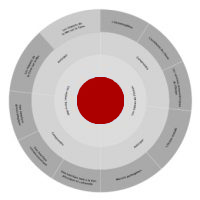Références
- World Bank Group. Europe and Central Asia Economic Update "Data, Digitalization, and Governance". Washington, DC : World Bank, 2021. License : CC BY 3.0 IGO.
- Head of Government. "General Guidelines for Digital Technology in Morocco to 2025". March 2020". March 2020.
- Mapnews. "Les médias au Maroc vivent au rythme d'une évolution numérique importante". Juillet 2020. Dernière consultation : le 25-07-202.
- OECD. "Building Trust to Strengthen Democracy: Key Findings from the OECD Survey 2021 on the Determinants of Trust in Public Institutions", OECD Publishing, Paris: 20224Edelman. "Edelman Trust Barometer 2022 : The Cycle of Distrust". 2022.
- Royal Institute for Strategic Studies, "Tableau de Bord Stratégique: 10th edition". October 2022: p. 135.
- Alterman, Eric. "When presidents lie: a history of official deception and its consequences", New York: Viking, 2004 ISBN: 0670032093.
- McIntyre, Lee. “Post-Truth”, The MIT Press, 2018. ISBN: 9780262535045.
- Han-Cheng Dai, Hai-Bin Zhang, Wen-Tao Wang. "The impacts of U.S. withdrawal from the Paris Agreement on the carbon emission space and mitigation cost of China, EU, and Japan under the constraints of the global carbon emission space". Advances in Climate Change Research, Volume 8, Issue 4, 2017, Pages 226-234, ISSN 1674-9278, https://doi.org/10.1016/j.accre.2017.09.003.
- Supreme court of the United States. No. 19–1392. June 2022.
- Jaffrelot, Christophe. “Religion, Caste, and Politics in India”. C Hurst & Co. April 2011 ISSN: 9781849041379600.
- Marwecki, Daniel. “Why Did the U.S. and Israel Leave UNESCO?” E-International Relations. February 2019.
- Nakamoto, S. "Bitcoin: A Peer-to-Peer Electronic Cash System”. Bitcoin. 2009.


